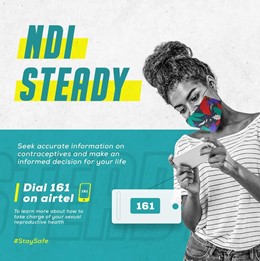By Lola Summer Flomen, Technical Learning Consultant, PSI, Kristen Little, Senior Technical Advisor of Strategic Research, PSI and Eden Demise, Research Coordinator, PSI
This piece was originally published on the R4S blog site.
The High Impact Practices in Family Planning (HIPs in FP) are proven approaches to increasing voluntary FP uptake in low- and middle-income countries (LMICs). The COVID-19 pandemic has demonstrated that operational instability can have profound effects on the implementation and effectiveness of FP programs. The suspension of FP outreach programs, movement restrictions, and disruptions in supply chains have affected the ability of FP programs to deliver products and services.
The use of digital technologies to strengthen the health system, support providers, and improve social and behavior change (SBC) is recommended as part of the HIPs. Digital tools are one solution to pandemic-related service delivery challenges. PSI programs have been quick to adapt to this new reality, allowing us to continue to deliver FP products and services by adopting a plethora of low-cost digital tools. R4S supported detailed documentation of these and other adaptations to help synthesize and share lessons learned.
Click on the highlighted countries on the map to learn more about the digital adaptations here.
Social and behavior change: Digital family planning tools have the ability to maintain existing programs and reach new clients
Family planning campaign on Facebook and Twitter in Uganda
In Uganda, the cessation of FP promotion programs made it difficult for women to access on-demand FP information. To promote self-care and educate women on FP, in June 2020, the Delivering Innovations in Self-Care (DISC) project launched the #NDISteady campaign on Twitter and Facebook. Digital advertisements drove prospective FP clients to the PSI-supported 161 phone service where women can dial 161 on their phones and be connected to FP service providers in six languages. The campaign reached 541,000 people across urban and rural areas, and over 10,000 asked to be referred to clinics.
“161 phone service has a better reach for rural target audiences for them to access more FP information and be able to self-refer.”— Alexandrina Nakanwagi, DISC project, PSI/Uganda
Connecting Nigerian youth to family planning on WhatsApp
In Nigeria, the suspension of FP outreach programs also meant suspending youth’s ability to access reliable information about FP. To prevent the transmission of COVID-19 while promoting FP awareness, in May 2020, the Adolescents360 (A360) project adapted their in-person youth-focused FP education program to an online digital campaign linking youth to virtual Life, Love, and Health classes. Youth can privately message providers on WhatsApp for personalized online FP counseling and can be referred to a nearby facility. Between May and June 2020, there was a 159% increase in new youth FP adopters compared to the same time period in 2019.
“Looking forward, we must integrate these adaptions beyond COVID-19 as it has expanded access to new youth populations.” — Joy Ede, Society for Family Health, A360 Nigeria
Service delivery: Digital tools have the power to promote counseling on voluntary contraception
Social enterprise e-counseling in India
In India, movement restrictions and fear of COVID-19 transmission made it difficult for women to access FP counseling in facilities. To safely deliver FP care, in June, PSI’s social enterprise (SE) team partnered with Docterz.com to provide customized e-counseling on contraceptive methods. From Docterz.com, customers are linked to a web-based pharmacy where they are able to purchase selected methods and have them delivered to their home. To date, Docterz.com has referred 549 customers.
“Clients are provided with guidance in a private and personalized manner, which facilitates their access to high quality products and services.”— Vidhi Kalra, SE, PSI/India
An enabling environment: Digital tools play a critical role in promoting FP commodity security and in supporting capacity building to improve FP programs
Social enterprise tele-detailing in Uganda
In Uganda, the lockdown made it difficult for medical detailers to sell FP products to private pharmacies and clinics. The SE Uganda team rapidly adopted a tele-detailing approach, using WhatsApp and phone calls to promote FP products to pharmacists and private providers. Between June and July 2020, medical detailers made 523 calls, which stimulated sales of 740 intrauterine devices and 38,160 condoms.
“Tele-detailing has saved detailers both time and money in promoting and distributing products.” — Kenneth Kiiza Mulogo, SE, PSI/Uganda
Virtual disability FP inclusion trainings in Kenya
To support the Kenyan government in continuing essential FP services, PSI’s Delivering Equitable and Sustainable Increases in Family Planning (DESIP) project quickly mobilized virtual conferencing to safely build provider capacity in FP services for women living with disabilities. Using video conferencing, PSI trained 246 government staff and community health workers on FP disability inclusion.
“Since their virtual trainings, the project has seen several provider-initiated efforts to make facilities more disability-friendly, including weekly sign language trainings, and making toilet stalls wheelchair accessible.”— Bill Okaka, DESIP, PS/Kenya
Beyond COVID-19: Integrating digital tools across HIPs
Throughout the pandemic, PSI has found that digital tools are critical in increasing clients’ demand for FP, improving efficiency of service delivery, promoting FP commodity security, and sustaining provider capacity building. The pandemic only accelerated the development and rollout of these tools, but it’s clear their use will continue in a post-pandemic world. As COVID-19 evolves, R4S will continue to support projects in monitoring and measuring the impact of digital adaptations across HIPs.

























